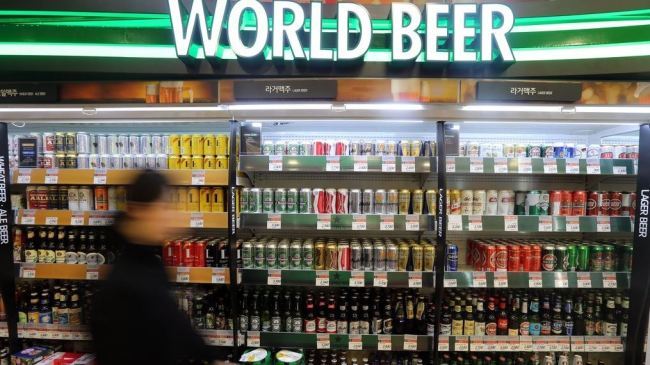[News Focus] New liquor tax proposal faces mixed response
By Kim Da-solPublished : June 4, 2019 - 16:32
A South Korean think tank’s recommendation to switch liquor taxes from price-based to volume-based system beginning with beer and makgeolli -- off-white rice wine -- has got a mixed market response.
According to the Korea Institute of Public Finance, the first liquor tax change in 50 years would involve three possible scenarios: apply the new volume-based tax on beer first; on both beer and makgeolli; or all liquor products -- but give a grace period for other alcoholic beverages except beer and makgeolli. Authorities explained that the changes can retain “tax neutrality without burdening consumers.”
The think tank said the volume-based tax system can easily be applied on beer and makgeoli, considering the price of other beverages vary significantly. But ultimately, all kinds of alcoholic beverages should come under the system.
KIPF’s study comes as market complaints have mounted that the current liquor tax system hampers local beer companies amid heated competition with cheaper imports.
Currently, under the price-based tax system domestic firms are levied a 72 percent liquor tax and other taxes based on volume output, sales, marketing costs and profit.
But foreign firms are taxed based on their imported price and tariffs only, making it possible to sell four cans at 10,000 won -- cheaper than domestic beer brands.
According to the Korea Institute of Public Finance, the first liquor tax change in 50 years would involve three possible scenarios: apply the new volume-based tax on beer first; on both beer and makgeolli; or all liquor products -- but give a grace period for other alcoholic beverages except beer and makgeolli. Authorities explained that the changes can retain “tax neutrality without burdening consumers.”
The think tank said the volume-based tax system can easily be applied on beer and makgeoli, considering the price of other beverages vary significantly. But ultimately, all kinds of alcoholic beverages should come under the system.
KIPF’s study comes as market complaints have mounted that the current liquor tax system hampers local beer companies amid heated competition with cheaper imports.
Currently, under the price-based tax system domestic firms are levied a 72 percent liquor tax and other taxes based on volume output, sales, marketing costs and profit.
But foreign firms are taxed based on their imported price and tariffs only, making it possible to sell four cans at 10,000 won -- cheaper than domestic beer brands.

According to the plan, the volume-based tax is expected to be set at 835-840 won per liter. If the tax is fixed at 835 won, it can lower the average price of a 500-milliliter can of local beer by 363 won, while raising the price of imported beer brands by around 89 won per can.
The domestic beer industry has hailed the volume-based tax system proposal.
“Levying taxes according to volume will not only set a level-playing field for local and imported beer companies, but will also be a starting point for South Korean firms to resolve the reverse-discrimination issues,” said an industry insider.
Ever since imported beer brands started flooding the market following various free trade agreements, the government has been facing criticism for the “unfair” difference in taxes on domestic and imported brands.
According to Korea Customs Service data, beer imports in the first three months of this year were valued at $72 million, a 4.5 percent increase from the previous quarter.
The Korea Craft Brewers Association also welcomed the move.
“If the volume-based tax system is approved by the National Assembly, there will be more investments in the craft brewery business. For a successful, vibrant market expansion, keeping price competitiveness through a volume-based tax system is necessary,” the association said in a statement.
Meanwhile. Makgeolli -- which is already subject to the lowest rate -- will have a volume-based tax at 40.44 won per liter.
Market insiders said they are not likely to be significantly impacted by the change, arguing that the focus should be on regulations that support the country’s traditional liquor business.
“The original tax on makgeolli is only around 5 percent, so we do not have much interest in the revision. What’s important is that the government should look into the business concept, structure and specific sales regulation of traditional liquor beverages,” said an industry insider.
Under the current law, makgeolli does not fall in the category of traditional liquor -- only recognized by beverages made by a liquor master or producers’ organization.
Producers of soju -- a distilled beverage of Korean origin -- also voiced concerns, citing the competitive market situation which is dominated by big players like Hite Jinro and Lotte, while small- and medium-sized firms in the regional areas are struggling with low market share.
Last month, market leader Hite Jinro raised the price of its soju brands by 6.45 percent, which made its rival follow with a 7.21 percent increase.
According to KIPF, the revised liquor tax system will also create expanded investments in production facilities and lead to increased employment.
The government said it will finalize the new liquor tax system after consultations with the ruling party within this week.
Some industry experts also pointed out the importance of raising liquor taxes in the country.
“One of the purposes of a volume-based liquor tax is to make drinkers pay a social cost. There is much room for the authorities to increase liquor taxes even more, as the revised plan will fall short of covering social and economic costs that must be levied on drinkers,” said economics professor Sung Myung-jae at Hongik University.
By Kim Da-sol (ddd@heraldcorp.com)










![[Hello India] Hyundai Motor vows to boost 'clean mobility' in India](http://res.heraldm.com/phpwas/restmb_idxmake.php?idx=644&simg=/content/image/2024/04/25/20240425050672_0.jpg&u=)









